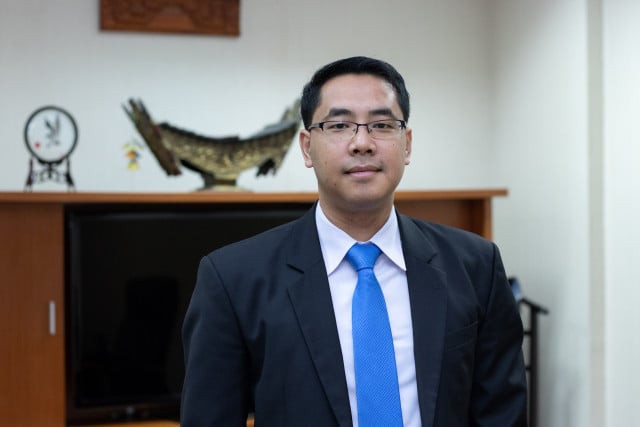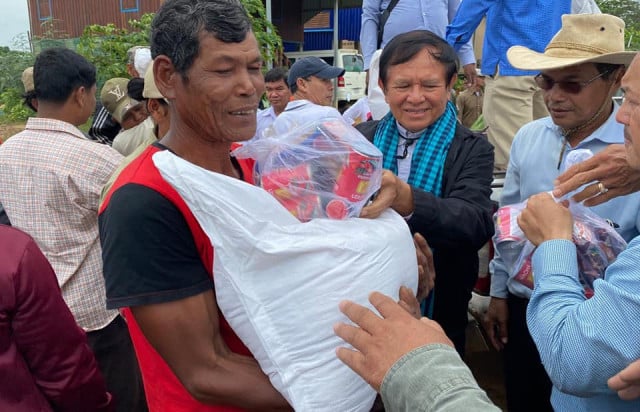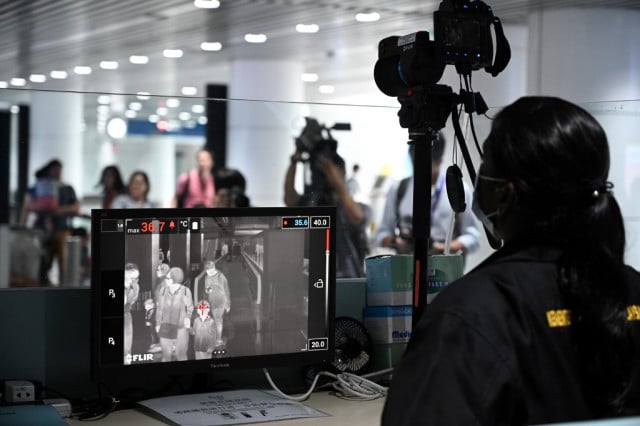Cambodia’s Growing Appetite for Evidence-based Policy and the Importance of Academic Research

- Sao Phal Niseiy
- March 7, 2020 3:45 AM
Thmey Thmey’s Sao Phal Niseiy caught up with Deth Sok Udom, associate professor of International Relations and currently the Rector of Paragon International University (formerly Zaman University) to discuss his latest book release, the ways research is influencing policies in Cambodia and the lack of funding currently provided to academics for such research.
Sao Phal Niseiy: You have contributed to two books so far as an editor and both have gained public attention especially among academic community. Could you please briefly tell us about the two books?
Deth Sok Udom: In 2017, with the support of Konrad Adenauer Stiftung (KAS) – Cambodia office, we published an edited volume on “Cambodia’s Foreign Relations in Regional and Global Contexts” which was intended as a comprehensive reference book for university students, but has proven useful for anyone seeking an understanding about the history and contemporary issues of Cambodia’s foreign affairs.
The second one published recently is titled “Cambodia 2040” (Volume 1: Economic Development) is a joint project by KAS-Cambodia and Future Forum. The book invites several authors – most of whom Cambodians – to offer their best-case scenario visions for Cambodia in different aspects (e.g. digitalization, education, art etc.) based on policies set out from today to achieve such ideal scenarios over the next two decades. The intention of the book is to generate awareness and discussions about what kind of future people wish to see in Cambodia.
Sao Phal Niseiy: Your first book focuses on Cambodia’s foreign relations while the second is on economic development in the Kingdom. How do you feel these two books contribute to Cambodia’s economic and foreign policy making process?
Deth Sok Udom: All chapters in our first book on Cambodia’s foreign relations provide historical background as well as contemporary opportunities and challenges in the country’s relations with neighboring countries and with various regional and global powers. We believe that by understanding such historical and present contexts, policy makers and other stakeholders – both current and future – can make informed and balanced decisions. These are imperative for a country’s destiny. Likewise, an informed and engaged public can express critical or supportive views which, to a certain extent, can influence policy-makers’ decisions.
As for the Cambodia 2040 book, “Economic Development” is featured in Volume 1. Whereas foreign policy will appear in Volume 3 later this year. Hopefully that will contribute further to the discussion about the foreign policy of Cambodia. Insofar as “Economic Development” is concerned, Volume 1 of Cambodia consists of nine chapters dealing with various topics ranging from fiscal policy to industrialization to climate change. We believe that all the chapters’ scenarios are thought-provoking, and that policy makers and young people alike would be inspired to envision the best for their country and dare to dream, and through discussion, they would also come to understand some of the challenges in policy making and how such constraints can be mitigated.

Sao Phal Niseiy: To what extent these publications contribute to academic and scholarly community?
Deth Sok Udom: For both of these books, attempts were made to ensure that most of the authors are Cambodians and of relative gender balance. It was more challenging to find qualified female authors for the book on Cambodia’s foreign relations, which reflects the fact that this it is still a predominantly male-oriented field of study and practice, especially at the higher level. This may change in the future, however.
Regardless, in terms of its contribution, I would like quote part of the review of the book by Prof. Sorpong Peou – a renowned Cambodian-Canadian political scientist – who wrote:
This is a wonderful book, which should be read as a useful point of reference by anyone interested in Cambodia’s contemporary relations with other states, especially major ones like China, Japan, Russia and the United States, as well as with regional and global organizations, most notably the Association of Southeast Asian Nations (ASEAN), the European Union (EU), and the United Nations (UN). […] This type of scholarly collaboration helps shed light on how scholars from different national, cultural, historical and disciplinary backgrounds make sense of complex relations between Cambodia and the rest of the world. To this extent, this book offers different insights that scholars and other interested individuals would find stimulating to their intellectual curiosity.
Prof. Sorpong Peou also offers some constructive critical comments of the book. Anyone interested can check out his full review here.
For the second book on Cambodia 2040, the use of fore-sighting as a methodology is required for all the authors who have engaged in this project. They were asked to think and write systematically in terms of forecasting the ideal scenario, scenario space and key factors, policy initiatives to achieve such an ideal scenario, as well as a baseline scenario. I believe that this approach has helped all the authors to be more systematic when it comes to thinking about possible scenarios for the future. And hopefully for the readers too!
It remains to be seen how it will be received by the scholarly community. But as always, while some may see the merit of such methods, others may think of it as being “unrealistic.” But then again, the intention of this book is to generate multiple visions and discussions about the future and relevant public policies. The more the merrier. Therefore, the book will have made its contribution one way or another.
Sao Phal Niseiy: The recent publications not only serve as a significant accomplishment but also indicate a thriving Cambodian academic and scholarly community. How do you see Cambodia’s prospects for future publications like this and what can be done to support it?
Deth Sok Udom: Research culture can strive if there is a demand for evidence-based policies. And there is definitely a demand for evidence-based policy making and implementation. But for it to happen, there has to be systematic financial support. Research grants that are offered based on competitive and fair selection mechanisms given to individual researchers or think tanks by the government as well as national and international partner institutions can be a good and reliable source of support. A recent initiative called Ponlok Chomnes to strengthen the capacity of the knowledge sector by the Australia’s Department of Foreign Affairs in partnership with the Asia Foundation is a great example.
Similarly, academic research can only thrive if there is a supportive environment. Researchers need to be able to think and write academically and objectively without fear or favor. Generally the problem in Cambodia is that many universities are teaching-focused without support for research. This is not an easy problem to solve because understandably budget resources are limited and research is given less of a priority. Nonetheless, each university has to create an environment where research is paid attention to, and if it is not financially possible, at least the support can be in terms of providing other incentives such as academic promotion criteria tied with research record, and establishing partnership for knowledge exchange and dissemination with respectable think thanks, for instance.
Sao Phal Niseiy: Share an exceptional experience you have had when getting involved with the project?
Deth Sok Udom: It has been a rewarding experience for me being involved in both projects. Certainly, there are challenges when working on big projects with several people at the same time, but that in itself is a positive learning process. I am particularly encouraged that the publications so far have generally been met with enthusiasm and support. I am excited and looking forward to the release of Volume 2 and Volume 3 of Cambodia 2040 later this year, and will definitely consider being involved in other initiatives after that.















